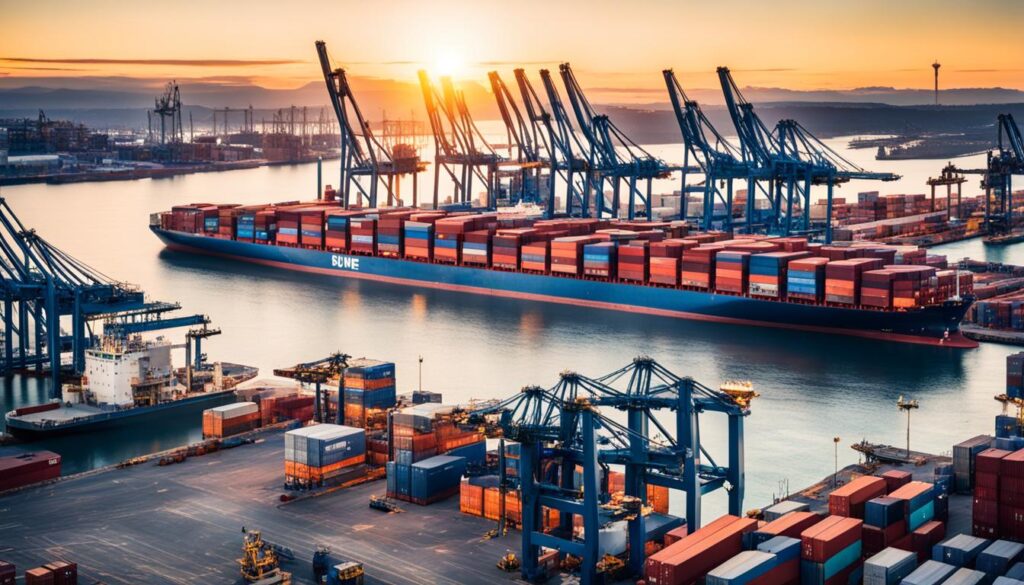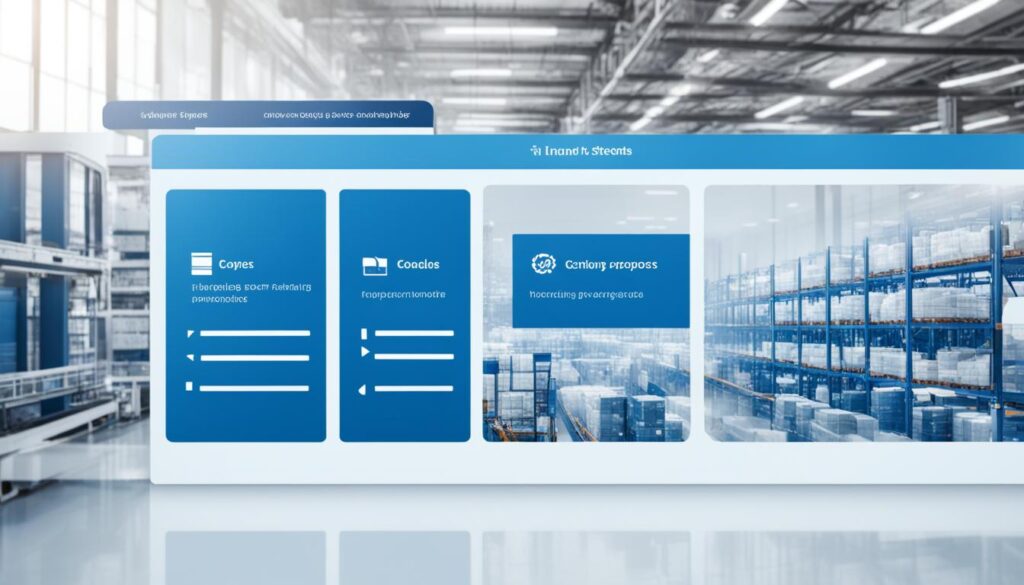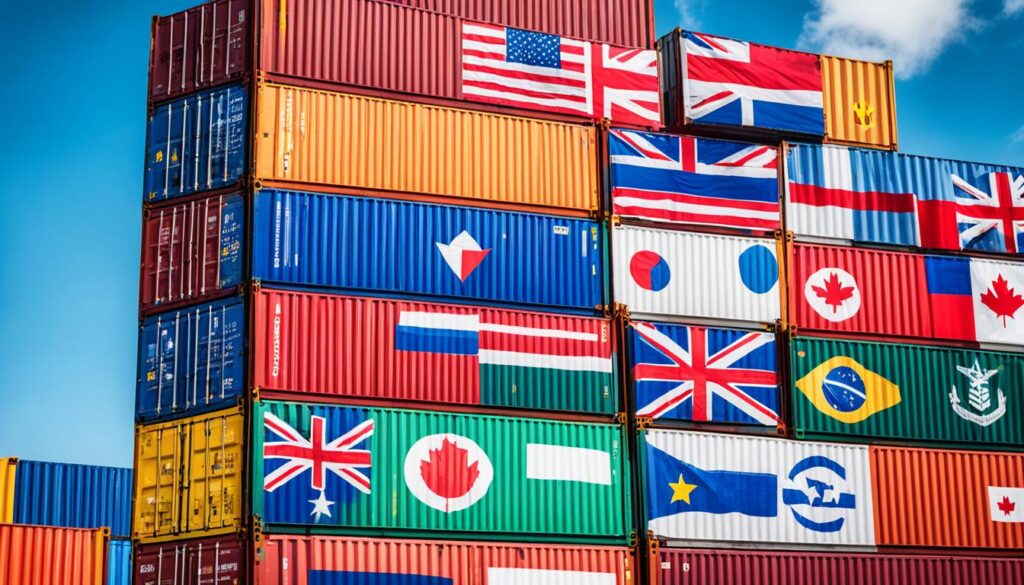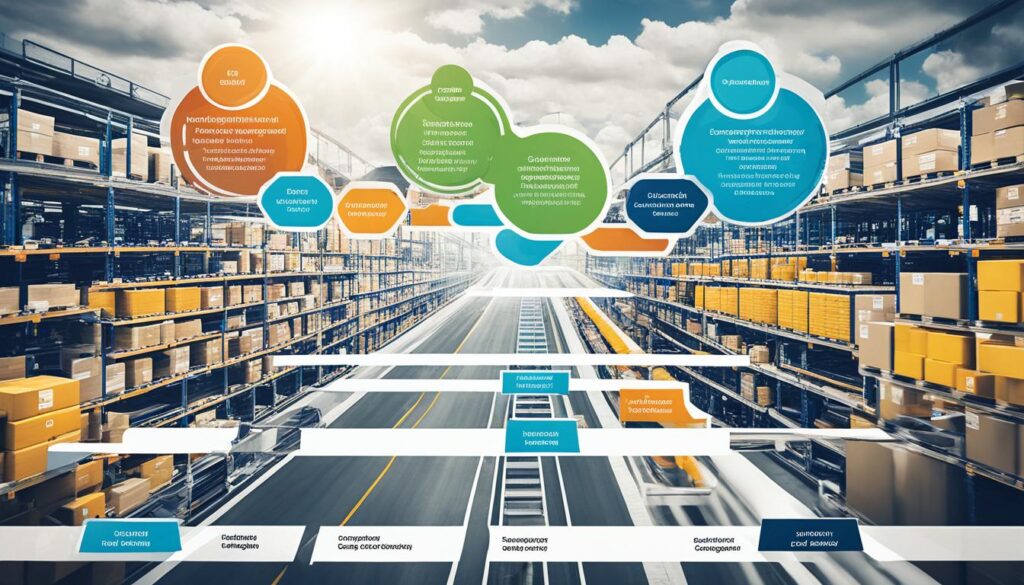Are you tired of dealing with delays, errors, and inefficiencies in your shipping processes? Do you want to discover a game-changing solution that can optimize your logistics, reduce costs, and improve customer satisfaction? Look no further, because I have the answer for you! In this article, we will delve into the world of automated shipping systems and explore how they have revolutionized the shipping industry.
Whether you are a freight forwarder, a supply chain manager, or a business owner who relies on transport services for international shipping, understanding the benefits and capabilities of automated shipping systems is crucial for staying ahead in this competitive market. From freight brokerage to customs clearance, these advanced logistical tools and technologies are reshaping the way businesses manage their shipping operations.
Join me as we uncover the evolution of shipping processes, the impact of automated shipping systems on operational efficiency, and future trends that will shape the industry. Get ready to unlock the potential of logistics technology and discover the key to a more efficient and streamlined shipping experience!
Key Takeaways:
- Automated shipping systems have revolutionized the logistics industry, offering more efficient and streamlined solutions for managing shipping processes.
- Implementing automated shipping software can optimize logistics, reduce errors, and improve customer satisfaction.
- Technological advancements like AI, machine learning, and robotics have driven the evolution of automated shipping systems, enhancing operational efficiency and data analytics capabilities.
- Automated shipping systems offer features like real-time tracking, inventory management, and automated order processing, improving overall efficiency and reducing errors.
- The future of automated shipping will be characterized by integration of IoT devices, sustainability initiatives, and enhanced cost-effectiveness.
The Evolution of Shipping Processes
Traditional shipping processes were characterized by delays, errors, and high costs, often resulting from manual methods. However, the introduction of automated shipping systems has revolutionized the industry, offering solutions that streamline operations and maximize efficiency. Through the integration of advanced technologies, such as AI, machine learning, and robotics, automated shipping systems have significantly improved accuracy, cost-effectiveness, and data analytics capabilities.
Manual methods of shipping often resulted in inefficiencies and human errors, leading to delays and increased costs. However, with the emergence of automated shipping systems, businesses can now leverage technology to optimize their shipping processes, driving operational efficiency and reducing the likelihood of errors and delays.
Technological advancements have played a key role in reshaping shipping processes. AI-powered algorithms and machine learning models enable automated shipping systems to learn from vast amounts of data, making accurate predictions and optimizing routes and schedules. Robotics has also been integrated into logistics operations, automating tasks such as package sorting and handling, thereby minimizing the need for manual labor and further enhancing operational efficiency.
One of the significant advantages of automated shipping systems is the ability to save time and costs. By streamlining processes, businesses can achieve faster order fulfillment, streamlined inventory management, and improved order accuracy. These time and cost savings contribute to increased customer satisfaction and a competitive edge in the market.
“Automated shipping systems have transformed the logistics industry, improving operational efficiency and reducing errors.”
Furthermore, automated shipping systems provide real-time tracking capabilities, allowing businesses to monitor shipments at every step of the journey. This not only enhances transparency but also enables prompt communication with customers regarding shipment status, resulting in improved customer satisfaction.
The evolution of shipping processes through automated shipping systems demonstrates the tremendous potential of technology to drive operational efficiency, improve accuracy, and reduce costs in the supply chain. As businesses continue to embrace and invest in these advanced solutions, the industry can expect further innovations and enhancements in the years to come.
Impact on Operational Efficiency
The adoption of automated shipping systems has a profound impact on operational efficiency. By replacing manual methods with technology-driven solutions, businesses can achieve higher levels of accuracy, productivity, and cost-effectiveness in their shipping processes.
Automated shipping systems offer a range of features that contribute to improved efficiency. With real-time tracking, businesses gain visibility into the location and status of their shipments, enabling proactive decision-making and early identification of any potential issues. This ensures timely delivery and customer satisfaction.
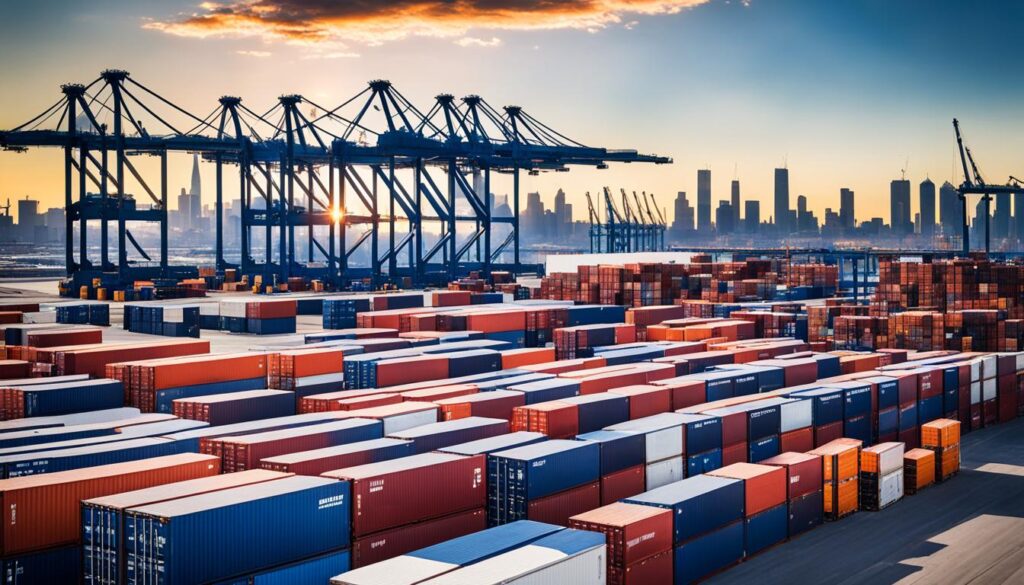
Furthermore, automated shipping systems streamline inventory management by automating the tracking of stock levels, reducing the risk of overstocking or stockouts. This allows businesses to optimize inventory levels, minimize storage costs, and improve overall operational efficiency.
Automated order processing is another key feature that enhances efficiency. Instead of manual order entry and processing, businesses can leverage automation to expedite order fulfillment, reducing the time and effort required to process orders and improving customer satisfaction.
“The adoption of automated shipping systems has significantly improved our operational efficiency. We have seen a significant reduction in errors and delays, leading to cost savings and improved customer satisfaction.” – Jane Smith, Logistics Manager
In summary, automated shipping systems have proven to be a game-changer for businesses seeking to enhance their operational efficiency. With features like real-time tracking, inventory management, and automated order processing, these systems deliver higher accuracy, productivity, and cost-effectiveness, revolutionizing the way shipping processes are managed.
Understanding Automated Shipping Systems
Automated shipping systems are revolutionizing the logistics industry by providing comprehensive tools and processes to streamline and optimize shipping operations. These systems offer a range of features that enhance efficiency and provide businesses with valuable insights for decision-making and continuous improvement.
One of the key features of automated shipping systems is real-time tracking. Through advanced technologies, businesses can monitor their shipments every step of the way, ensuring accurate information and transparency for customers. Real-time tracking not only improves customer satisfaction but also allows businesses to proactively address any potential delays or issues in the shipping process.
Inventory management is another critical aspect of automated shipping systems. With automated inventory management capabilities, businesses can easily track and manage their stock levels, ensuring optimal inventory control and minimizing the risk of overstocking or stockouts. This efficient management contributes to improved order fulfillment and reduced operational costs.
Automated order processing is yet another advantage offered by these systems. By automating the order processing workflow, businesses can eliminate manual tasks and improve order accuracy and speed. Orders can be processed in real-time, ensuring prompt fulfillment and timely delivery to customers.
Data analytics is a powerful feature of automated shipping systems that provides businesses with valuable insights into their shipping processes and performance. By analyzing the data generated by the system, businesses can identify trends, areas for improvement, and cost-saving opportunities. Data analytics enables data-driven decision-making, allowing businesses to make strategic choices that optimize their shipping operations.
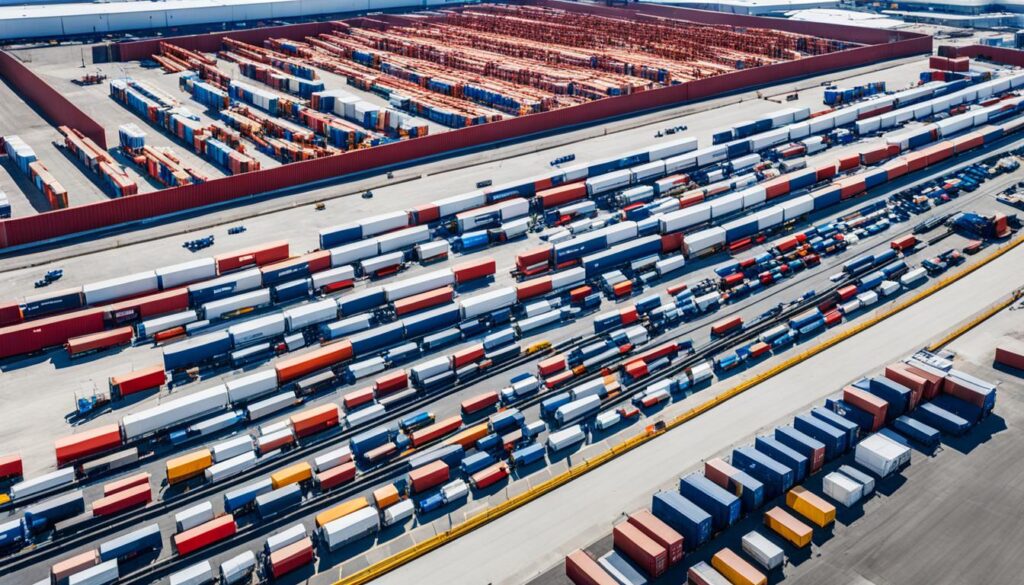
With their real-time tracking capabilities, inventory management features, automated order processing, and data analytics functionalities, automated shipping systems provide businesses with powerful tools to optimize their shipping processes. These systems enhance operational efficiency, improve customer satisfaction, and drive continuous improvement in the logistics industry.
Future Trends in Automated Shipping
The future of automated shipping holds exciting possibilities for the logistics industry. With rapid advancements in technology and the rise of the Internet of Things (IoT), the way goods are transported and managed is undergoing significant transformations. These developments are driving the industry towards enhanced efficiency, sustainability, and customer satisfaction.
One of the key trends that will shape the future of automated shipping is the integration of IoT devices. This connectivity between physical objects and the internet will revolutionize supply chain operations by enabling real-time tracking and predictive analytics. With IoT, businesses can monitor the location, condition, and performance of their shipments, allowing for better visibility and proactive decision-making.
Another crucial aspect of the future of automated shipping is sustainability. As environmental concerns become increasingly prominent, the industry is turning its focus towards eco-friendly practices and alternative energy sources. By adopting cleaner technologies and optimizing routes, automated shipping systems can reduce carbon emissions and minimize their ecological footprint.
“The integration of IoT devices in automated shipping will enable real-time tracking and predictive analytics, while sustainability initiatives will drive eco-friendly practices and alternative energy sources.”
These future trends in automated shipping will result in enhanced cost-effectiveness and streamlined processes. With real-time tracking and data analytics, businesses can make informed decisions, optimize routes, and reduce operational costs. Moreover, sustainability initiatives will not only benefit the environment but also attract environmentally conscious customers who prioritize eco-friendly practices.
Key Takeaways:
- The future of automated shipping will be shaped by the integration of IoT devices, enabling real-time tracking and predictive analytics.
- Sustainability initiatives will play a significant role in automated shipping, promoting eco-friendly practices and alternative energy sources.
- These future trends will lead to enhanced cost-effectiveness, streamlined processes, and improved customer satisfaction in automated shipping.
Miami’s World-Class Global Shipping Infrastructure
Miami, known as the “Gateway to the Americas,” boasts a world-class global shipping infrastructure. From the bustling PortMiami to the efficient Miami International Airport, the city offers a range of logistics solutions to businesses engaged in global shipping.
PortMiami – Seamless Connections and Strategic Advantage
PortMiami, one of the busiest ports in the United States, serves as a vital gateway for international trade. With its strategic location and deep-water harbor, PortMiami provides seamless connections to over 100 countries worldwide. The port’s state-of-the-art cargo terminals and efficient container terminal ensure expedited operations and smooth movements of goods.
Miami International Airport – A Major Cargo Hub
Miami International Airport strengthens Miami’s position as a global shipping hub. With impressive air connectivity, the airport serves as a crucial link for freight forwarding and logistics services. Over 100 airlines and 160 destinations make Miami International Airport the third busiest airport in the United States for international passengers. The airport’s modern cargo facilities, equipped with refrigeration capabilities, cater to the transportation of perishable goods, adding to its appeal for businesses in various industries.
Foreign Trade Zones – Advantages for International Trade
Miami’s Foreign Trade Zones offer significant advantages for businesses engaged in international trade. These zones provide various benefits, including duty deferrals, exemptions, and streamlined customs processes. Companies operating within the Foreign Trade Zones can take advantage of cost savings and increased operational efficiencies, enhancing their competitiveness in the global market.
Efficient Warehousing and Distribution Centers
Miami’s global shipping infrastructure encompasses a network of efficient warehousing and distribution centers. Meeting the growing demand for logistics services, these facilities offer comprehensive storage solutions, including temperature-controlled environments and e-commerce fulfillment centers. Leading logistics providers, such as Fulfillment Hub USA, ensure efficient handling and distribution of goods while utilizing advanced technologies to optimize supply chain operations.
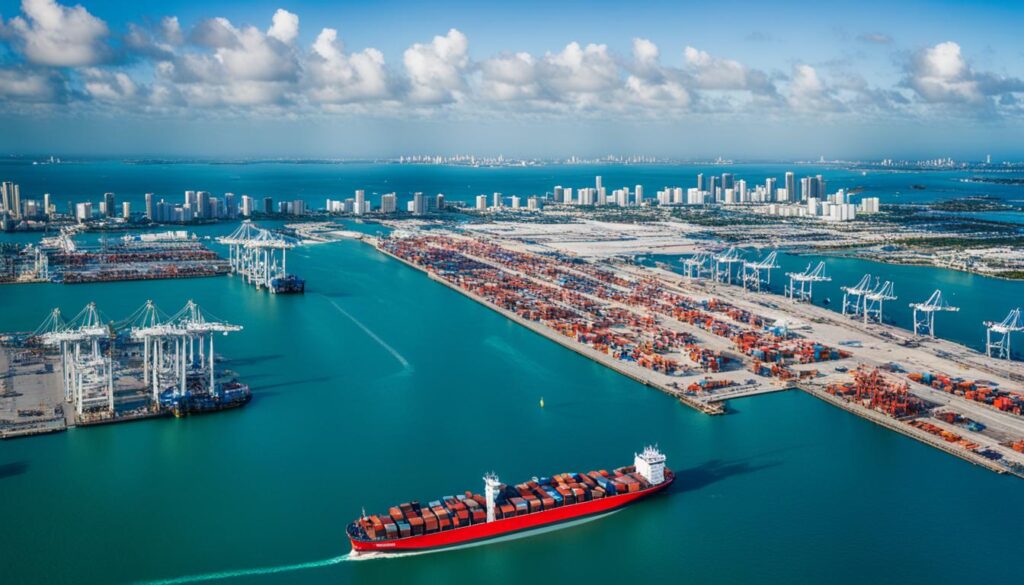
| Key Features | PortMiami | Miami International Airport | Foreign Trade Zones | Warehousing and Distribution Centers |
|---|---|---|---|---|
| Global Connectivity | ✔️ | ✔️ | ||
| Efficient Operations | ✔️ | ✔️ | ||
| State-of-the-Art Facilities | ✔️ | ✔️ | ✔️ | |
| Strategic Location | ✔️ | ✔️ | ||
| Advantages for International Trade | ✔️ |
PortMiami – The Jewel of Miami’s Shipping Industry
PortMiami is the heart of Miami’s shipping industry, serving as a vital link between the Americas and the rest of the world. With its deep-water harbor and modern facilities, PortMiami is a crucial hub for global trade and commerce. The port provides seamless connections to over 100 countries worldwide, making it an ideal choice for businesses looking to expand their international shipping operations.
Boasting 7 dedicated cruise terminals and 9 cargo terminals, PortMiami offers a wide range of services to cater to the needs of different industries. The cargo terminals handle a diverse array of goods, ranging from perishable items to bulk commodities, ensuring that businesses can efficiently transport their products to global markets.
The container terminal at PortMiami, which is the largest in Florida, plays a pivotal role in the shipping industry. It provides state-of-the-art facilities for the handling and storage of containers, enabling efficient and secure movement of goods. By leveraging its strategic location and advanced infrastructure, PortMiami has become a key player in the international shipping landscape, driving economic growth and creating opportunities for businesses in Miami and beyond.
With its commitment to innovation, PortMiami continues to invest in cutting-edge technologies and sustainability initiatives, further strengthening its position as a world-class port. The port’s dedication to environmental stewardship and green practices ensures that shipping activities are conducted in an eco-friendly manner, minimizing the impact on the environment.
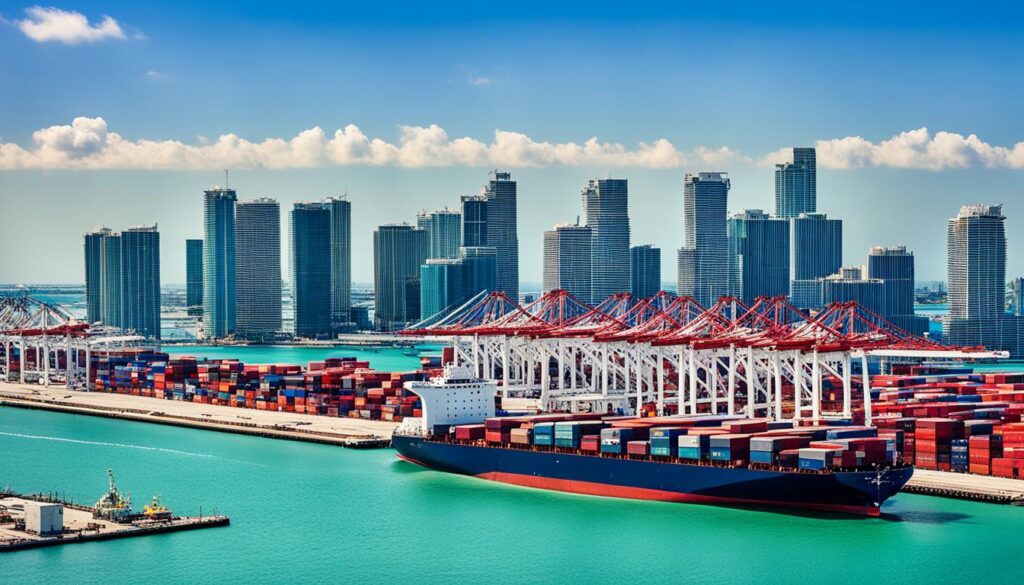
The image above showcases the bustling activity at PortMiami, highlighting its importance as a major hub in the shipping industry.
PortMiami’s Key Features:
- Deep-water harbor enabling the handling of large vessels
- Modern and efficient cargo terminals for seamless operations
- Florida’s largest container terminal for containerized cargo
- Strategic location for easy access to global markets
- Commitment to sustainability and eco-friendly practices
With its impressive infrastructure, strategic location, and commitment to excellence, PortMiami continues to drive the growth of Miami’s shipping industry and plays a vital role in facilitating global trade.
Miami International Airport – A Sky-High Advantage
Miami International Airport (MIA) is a bustling hub for air cargo, offering businesses unparalleled access to global markets. With over 100 airlines and 160 destinations, MIA ranks as the third busiest airport in the United States for international passengers.
As a major cargo hub, MIA plays a pivotal role in facilitating trade and ensuring efficient logistics operations. The airport’s state-of-the-art cargo facilities and strategic location make it a preferred choice for businesses looking to transport perishable goods and other time-sensitive cargo.
One of the standout features of MIA is its refrigeration capabilities, which cater to the transportation of temperature-sensitive goods. This includes perishable items like fresh produce, pharmaceuticals, and other goods that require controlled environments. With reliable refrigeration facilities in place, MIA ensures that cargo remains in optimal conditions throughout its journey.
Table:
| Key Features of Miami International Airport |
|---|
| Air Connectivity |
| Cargo Hub |
| Refrigeration Capabilities |
Unparalleled Air Connectivity
MIA boasts an extensive network of over 100 airlines, connecting businesses to 160 destinations worldwide. This broad reach allows for seamless transportation of cargo to and from Miami, providing unrivaled access to global markets and facilitating international trade.
A Major Cargo Hub
Recognized as a key cargo hub, MIA plays a vital role in the movement of goods. Its strategic location in Miami, a gateway city to the Americas, positions it as a central point for logistics operations. Businesses can leverage the airport’s efficient cargo handling processes and intermodal connections to expedite shipping processes and reduce transit times.
Refrigeration Capabilities for Perishable Goods
MIA’s refrigeration capabilities make it an ideal choice for businesses involved in the transportation of perishable goods. The airport’s advanced facilities ensure that cargo requiring temperature-controlled environments, such as fresh produce and pharmaceuticals, remain in optimal conditions throughout the shipment process. This commitment to refrigeration capabilities enhances the efficiency and quality of perishable goods transportation.
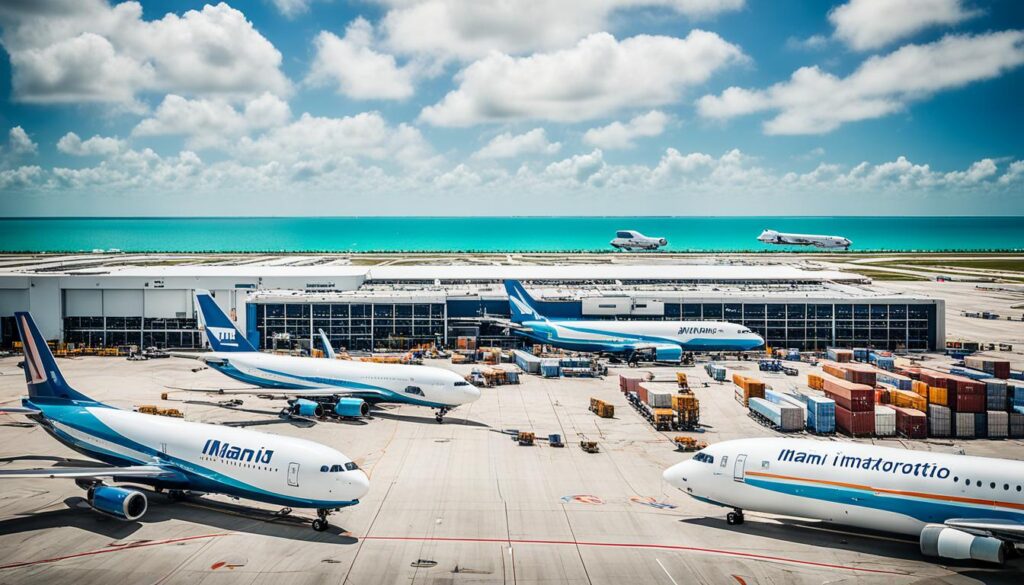
Miami International Airport offers air connectivity to over 160 destinations and serves as a major cargo hub with state-of-the-art refrigeration capabilities for perishable goods transportation.
Warehousing and Distribution Centers – Efficient Logistics Solutions
Miami has experienced a significant boom in the development of modern logistics facilities, catering to the increasing demand for warehousing and distribution services in the region. These state-of-the-art facilities are equipped with cutting-edge technologies and offer diverse storage solutions to accommodate various business needs.
One of the key advantages of these facilities is their ability to provide temperature-controlled environments, ensuring the safe storage of perishable goods and sensitive products. With these specialized storage capabilities, businesses can maintain the quality and integrity of their inventory, guaranteeing customer satisfaction.
Moreover, the rise of e-commerce has fueled the need for efficient fulfillment centers. Miami’s warehousing and distribution centers are equipped with advanced technologies that support seamless e-commerce operations. From inventory management to order processing and fulfillment, these facilities streamline the entire fulfillment process, enabling businesses to meet the growing demands of online customers.
As a prominent logistics provider in Miami, Fulfillment Hub USA offers comprehensive warehousing and distribution solutions tailored to the specific requirements of businesses in the region and beyond. With their expertise and state-of-the-art facilities, Fulfillment Hub USA ensures efficient inventory management, timely order processing, and reliable logistics services, enabling businesses to focus on their core operations and achieve their growth objectives.
